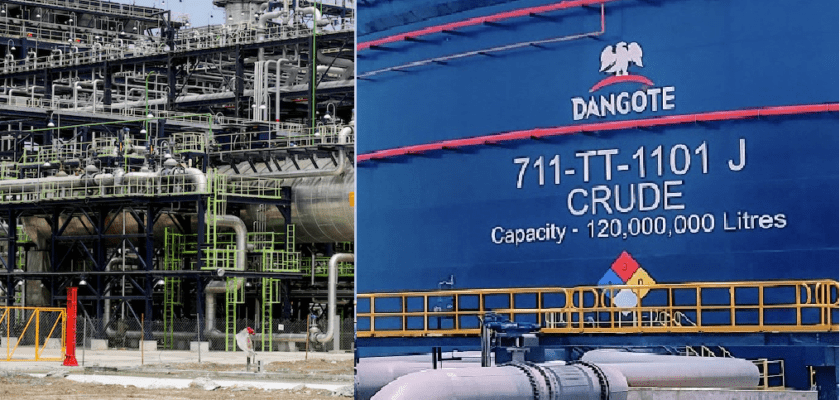By: Abdullahi Inuwa
When Nigeria’s richest man, Aliko Dangote, first whispered about building a refinery the size of a small city, many dismissed it as another overambitious African billionaire’s dream. Today, the giant plant sitting in the Lekki Free Trade Zone is no longer a dream. It is a towering reality—and its tremors are rattling through Nigeria’s business environment in ways no one anticipated.
From the street corner mechanic to billion-dollar conglomerates, responses to Dangote’s refinery reveal a mix of awe, shock, and nervous recalibration. Simply put: there has never been anything like it in Nigeria.
A Market Earthquake
The Dangote refinery is not just another industrial facility. Its scale dwarfs anything ever attempted in the country’s private sector. Designed to process 650,000 barrels of crude per day, it doesn’t merely join the oil market—it distorts it.
Think of it this way: imagine if someone arrived in Lagos tomorrow, constructed five million one- and two-bedroom apartments, and decreed that rent would now be paid monthly instead of yearly. The landlord lobby, which has thrived on squeezing annual advances from tenants, would be turned on its head overnight. That is what the refinery represents: a disruption so large that entire ecosystems, not just the petroleum sector, must now bend or break.
Getting Its Sea Legs
Industry watchers emphasize that the refinery is still in its infancy. Like a giant ship on its maiden voyage, it is finding balance, calibrating crude supplies, and testing its distribution networks. But the implications are already clear.
Once the refinery achieves operational stability, any firm importing petroleum products into Nigeria will be fighting a losing battle. Why? Because the sheer scale, location, and integration of Dangote’s operation allow him to undercut costs in ways importers simply cannot match.
Is this a monopoly? Some critics are already whispering the word. But others argue: this is not Dangote’s fault. For decades, other billionaires and foreign firms had the chance to invest in refining. They looked away, preferring to profit from the broken system of fuel imports. Dangote stepped into a blue ocean they ignored, and now he is the lone giant in a market suddenly too small for anyone else.
Beyond Petroleum: The FX Shockwave
The consequences extend beyond the pump. Every economist knows that Nigeria’s foreign exchange (FX) market is fragile, relying heavily on inflows from crude exports and remittances. For years, NNPC’s dollar remittances determined the strength—or weakness—of the naira.
Now, Dangote’s refinery looms as a new swing factor. With billions of dollars in transactions tied to crude purchases, exports of refined products, and potential inflows from regional sales, the refinery could become a stabilizing—or destabilizing—force in Nigeria’s FX market. Imagine one private company influencing exchange rates as decisively as a national oil company. That’s where this story is headed.
Filling Stations Across West Africa?
But Dangote is not known for thinking small. Insiders hint that once the refinery’s domestic footprint solidifies, his gaze will shift outward. The next frontier? Buying up filling stations across West Africa.
If that prediction comes true, Nigeria’s fuel market will not just be transformed—it will become the launching pad for a regional fuel empire. From Ghana to Côte d’Ivoire to Senegal, stations branded “Dangote” could soon redefine how West Africans buy their petrol and diesel.
For local competitors, this is a frightening prospect. For consumers weary of erratic supplies and inflated prices, it could be salvation.
Old Guards vs. the New Reality
Some analysts compare the current resistance to Dangote’s refinery with the infamous battle between the horse lobby and the car industry in the early 20th century. The horse traders scoffed at cars, ridiculed their noise, and resisted their spread. But history was not on their side.
Today, importers of petroleum products, middlemen in the supply chain, and even landlords in unrelated sectors are waking up to a similar lesson: when scale and innovation collide with old models, disruption is inevitable.
The Nigerian business environment had long been a predictable ecosystem of rent-seeking and inefficiency. Dangote has just detonated a bomb in the middle of it.
The Bigger Picture
Of course, questions remain. Will the refinery’s sheer size create complacency or inefficiency in the long run? Could its dominance stifle competition instead of spurring innovation? How will regulators balance national interest with the influence of one private player?
Yet, even skeptics admit that Dangote’s refinery has already achieved what decades of government promises failed to deliver: hope that Nigeria can refine its own crude at scale.
A Game Changer, No Going Back
As Nigerians watch this refinery find its footing, one truth is clear: the rules of the game have changed forever.
Importers who once feasted on Nigeria’s dependence must either pivot or perish. The FX market must brace for a new heavyweight. And across West Africa, fuel retailers may soon wake up to find Dangote’s empire knocking at their doors.
This is not merely an investment; it is an earthquake. And like all earthquakes, it does not ask permission before reshaping the landscape.
For better or worse, Nigeria will never be the same again.
Abdullahi Inuwa Social Commentator ainuwa303@gmail.com




